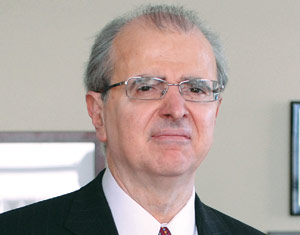Jonathan Lippman
September 09, 2011 | New York Law Journal
Courts' Response to 9/11: A 'Testament to Resilience'By Jonathan Lippman
3 minute read
September 24, 2012 | New York Law Journal
Family Court 50 Years LaterBy Jonathan Lippman
9 minute read

May 01, 2012 | New York Law Journal
State Courts Weather the StormMore than anything else, what makes this country great is our commitment to the rule of law and our protection of the liberties enshrined in our state and federal constitutions. It is that promise of liberty and freedom - that singular dedication to the rule of law that applies equally to each and every person in this country regardless of their standing in life - that sets us apart and extends our capacity to grow and excel. To live up to that promise, we must have an independent and impartial judiciary, adequately funded and co-equal to the other branches of government.
By Jonathan Lippman
5 minute read

May 01, 2013 | New York Law Journal
Marking 50 Years of 'Gideon'Reflections on equality are especially fitting this year, the 150th anniversary of President Abraham Lincoln's Emancipation Proclamation and the 50th anniversary of the March on Washington and Dr. Martin Luther King Jr.'s world-changing "I Have a Dream" speech. It is also the 50th anniversary of another milestone in the history of equal justice in the United States.
By Jonathan Lippman
4 minute read
May 01, 2002 | Law.com
Opening Doors With TechnologyWe stand at the threshold of the electronic courthouse. In the very near future, electronic filing and imaging technologies could enable anyone with Internet access to retrieve, review and print out court records from his or her computer. While the U.S. has a tradition of an open justice system, that commitment to openness will be put to the test as courts grapple with just how much information should be accessible.
By Jonathan Lippman
9 minute read

January 22, 2013 | New York Law Journal
Work on Closing the Justice GapJonathan Lippman, Chief Judge of the State of New York, writes: Every year, millions of the most vulnerable New Yorkers are left to navigate a complex legal system without the help of a lawyer. We have made great strides in addressing the justice gap between the need for legal assistance and the resources available to fill that need through increased public funding and the efforts of the judiciary and the bar. But the job is far from done.
By Jonathan Lippman
5 minute read
January 23, 2012 | New York Law Journal
Rethinking Juvenile JusticeJonathan Lippman, Chief Judge of the State of New York, writes: In New York state, for far too long, far too many teenagers charged with low-level, non-violent crimes have been tried and sentenced as adults. This year marks the beginning of a new era in juvenile justice in New York.
By Jonathan Lippman
6 minute read
January 25, 2010 | New York Law Journal
New Attorney Emeritus Program Is AnnouncedI am certainly not alone in observing a renewed commitment to pro bono within the legal profession in this state in response to the growing legal needs of New Yorkers hurt by the economic downturn, but we cannot rest, because 2010 promises to be one of the worst years in memory for the legal services community. In these difficult economic times, we need to draw on our long tradition of helping those in need like never before and redouble our efforts to meet our shared responsibility to foster equal access to justice for all New Yorkers.
By Jonathan LippmanChief Judge, State of New York
8 minute read

December 17, 2008 | New York Law Journal
Institutional Independence Of the JudiciaryIn remarks given upon receipt of the William H. Rehnquist Award for Judicial Excellence, Jonathan Lippman, presiding justice of the Appellate Division, First Department, said: So much of the criticism directed at judges and courts these days is predicated on a distorted concept of accountability. Well-funded and organized interest groups are campaigning to convince Americans that the judiciary is no different from the political branches of government. With the judiciary no longer sitting on a public pedestal or enjoying the kind of societal esteem that sustained us in the past, there is no greater challenge for court systems today than to prevent these efforts from metastasizing into broader attacks on the judiciary's capacity to govern itself as a co-equal branch of government.
By Jonathan Lippman
13 minute read
Trending Stories
- 1Gibson Dunn Sued By Crypto Client After Lateral Hire Causes Conflict of Interest
- 2Trump's Solicitor General Expected to 'Flip' Prelogar's Positions at Supreme Court
- 3Pharmacy Lawyers See Promise in NY Regulator's Curbs on PBM Industry
- 4Outgoing USPTO Director Kathi Vidal: ‘We All Want the Country to Be in a Better Place’
- 5Supreme Court Will Review Constitutionality Of FCC's Universal Service Fund
More from ALM
- Legal Speak at General Counsel Conference East 2024: Match Group's Katie Dugan & Herrick's Carol Goodman 1 minute read
- Legal Speak at General Counsel Conference East 2024: Eric Wall, Executive VP, Syllo 1 minute read
- Legal Speak at General Counsel Conference East 2024: Virginia Griffith, Director of Business Development at OutsideGC 1 minute read



